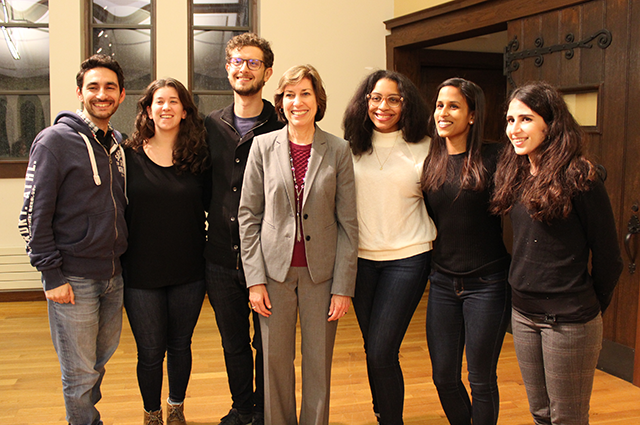Role model in space

By Lynne Powers
When Dr. Ellen Ochoa first went to college, she didn’t know what she wanted to study. “I thought I’d be a business or a music major,” she says, now. As she finished a series of Calculus classes, she began to ask her fellow students what they were majoring in, and she found that she was surrounded by engineers, physicists, and chemists in training. She discussed her options with faculty members, including a particularly welcoming student advisor from San Diego State University’s physics department who helped to explain what she might do with a physics major, and the rest is history.
Over a distinguished 30-year career at NASA, Ochoa managed a research team in high-performance computing, participated in four space flights as an astronaut, and led the Johnson Space Center for five and a half years. She was a trailblazer and an innovator, serving as the first Hispanic director and the second female director of the Johnson Space Center. When she joined a nine-day mission aboard the space shuttle Discovery in 1993, she became the first Hispanic woman in the world to go to space.
These days, Ochoa is the vice chair of the National Science Board (working alongside chair and Tufts University professor Diane Souvaine), the governing body of the National Science Foundation. On April 22, Ochoa visited Tufts to deliver a Women in STEM Lecture. Co-sponsored by the School of Engineering and the Graduate School of Arts and Sciences, the bi-annual event explores the role of women in STEM, addressing the historical and contemporary challenges facing them and celebrating the successes of women scientists. In her lecture, Ochoa shared her personal and professional experience at NASA with an audience of graduate and undergraduate students, postdoctoral scholars, faculty, staff, and Tufts community members.
NASA’s astronaut class of 1978 was the first class to include women and people of color, though Ochoa wasn’t even considering applying for the program in the future, at the time – she had just changed her major to physics. When Sally Ride became the first American woman in space in 1983, Ochoa realized that Ride, too, was a physics major and had attended Stanford University, where Ochoa earned her M.S. and Ph.D. in electrical engineering. “Seeing someone who had things in common with me [join NASA’s astronaut program and go to space] made a huge difference to me in terms of thinking, ‘This is something I can actually do,’” Ochoa said.
Ochoa ultimately logged over 1,000 hours in space across four missions, and during several of those missions, she helped to assemble the International Space Station (ISS). She walked the audience through her experience and shared some of the research and projects that are conducted on the ISS and space shuttles, including everything from botany to mechanical engineering to medical science to 3D printing.
Ochoa closed her talk by telling the audience about her experience in leadership after she retired from spaceflight. “When you move into a leadership position, you have to define exactly what your role is,” she said, and defining one’s mission is critical. As director of NASA’s Johnson Space Center, Ochoa saw her mission as twofold: accomplishing today’s mission while preparing for tomorrow’s.
In order for employees to be able to think ahead and come up with the innovative projects and procedures of tomorrow, Ochoa knew they needed to be valued and respected. “People need to feel like they can speak up and bring new ideas and they’ll be heard,” she said. She wanted to see women in a wide variety of roles across NASA, and she encouraged new initiatives at the Johnson Space Center like flexible work arrangements and supported employee resource groups focused on the experience of women in STEM fields.
In a lively question and answer session, Tufts students had the opportunity to dig deeper into the topics raised by Ochoa’s lecture, raising questions that ranged from the availability of opportunities for students who have a B.S. or M.S. rather than a Ph.D. (Ochoa mentioned that most staff at Johnson Space Center don’t have a doctorate), to the best ways to communicate complex scientific and technical topics to the general public (Ochoa, who’s active on Twitter, is partial to social media).
One Tufts student wanted to know how the field of aeronautics and space exploration had changed over the years, and what Ochoa had learned that hadn’t necessarily been emphasized in her training. In response, Ochoa said that over her career, she has found that an international mindset, openness to multicultural experiences, and being able to collaborate are key. On a practical level, astronauts on the ISS could find themselves working with colleagues from across the world, and there’s a global culture of information-sharing when it comes to advancing human space flight and learning. You have to be both a good leader and a good follower, Ochoa said. “You’re responsible for personal excellence and also for understanding that the team’s success is more important than personal glory.”
While Ochoa was inspired by Sally Ride's example, she’s now paying it forward to the next generation of scientists, engineers, and astronauts. She shared information with interested Tufts students about NASA’s Pathways Programs and stayed after the lecture to chat with students, including members of Tufts’ new chapter of Students for the Exploration and Development of Space (SEDS). Associate Director of Financial Aid Amy Piantedosi brought her daughter to the lecture, and space enthusiast and second-grader Quinn summed it all up. "I didn’t really think I could be an astronaut," she said, "but seeing [Ochoa] made me think I can."
Couldn’t make it to the lecture? Learn more about Dr. Ellen Ochoa at Commencement this year, where she will be receiving an honorary doctor of engineering from Tufts, and listen to Tufts’ Tell Me More podcast, where she was interviewed by School of Engineering Professor and Dean of Graduate Education Karen Panetta.